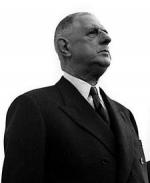Disable ads!
Charles de Gaulle
Charles André Joseph Marie de Gaulle (French: [ʃaʁl də ɡol] ( listen); 22 November 1890 – 9 November 1970) was a French general, resistant, writer and statesman. He was the leader of Free France (1940–44) and the head of the Provisional Government of the French Republic (1944–46). In 1958, he founded the Fifth Republic and was elected as the 18th President of France, until his resignation in 1969. He was the dominant figure of France during the Cold War era and his memory continues to influence French politics. Born in Lille in a devout Catholic and patriotic family, he embraced a military career and graduated from Saint-Cyr in 1912. He was a decorated officer of the First World War and came to the fore in the Interwar period as a proponent of mobile armoured divisions. At the beginning of the Second World War, he led an armoured division that inflicted several reverses on the invading German army. Refusing to accept his government's armistice with Nazi Germany in 1940, De Gaulle exhorted the French population to resist occupation and to continue the fight against Axis powers in his Appeal of 18 June. He led a government in exile and the Free French Forces against the Axis. Despite frosty relations with Britain and especially the United States, he emerged as the undisputed leader of the French resistance. He became Head of the Provisional Government of the Republic in June 1944, the interim government of France following the liberation of France. When the Algerian war was ripping apart the unstable Fourth Republic, the National Assembly brought him back to power during the May 1958 crisis. De Gaulle founded the Fifth Republic with a strengthened presidency, and he was elected in the latter role. He managed to keep France together while taking steps to end the war, much to the anger of the Pieds-Noirs (Frenchmen settled in Algeria) and the military; both previously had supported his return to power to maintain colonial rule. He granted independence to Algeria and progressively to other French colonies. Economically, he pursued a dirigist policy, which included substantial state-directed control over a capitalist economy. In the context of the Cold War, de Gaulle initiated his "Politics of Grandeur", asserting that France as a major power should not rely on other countries, such as the United States, for its national security and prosperity. To this end, de Gaulle pursued a policy of "national independence" which led him to withdraw from NATO's military integrated command and to launch an independent nuclear development program that made France the fourth nuclear power. He restored cordial Franco-German relations in order to create a European counterweight between the "Anglo-Saxon" (American and British) and Soviet spheres of influence. However, he opposed any development of a supranational Europe, favouring a Europe of sovereign Nations and vetoed twice Britain's entry into the European Community. De Gaulle openly criticised the U.S. intervention in Vietnam and the "exorbitant privilege" of the U.S. dollar, and supported an independent Quebec. In May 1968, he appeared likely to lose power amidst widespread protests by students and workers, but survived the crisis with backing from the Army and won an election with an increased majority in the Assembly. Nonetheless, de Gaulle resigned in 1969 after losing a referendum in which he proposed more decentralization. He died a few months later at his residence in Colombey-les-Deux-Églises. His War Memoirs, written in the 1950s, quickly became a classic of modern French literature. Many French political parties and figures claim the gaullist legacy.
 Read more on wikipedia.org Read more on wikipedia.org
 All quotes by Charles de Gaulle All quotes by Charles de Gaulle
 Edit Edit
|

|
|
|
|
|
Background photo by Giuliana
|